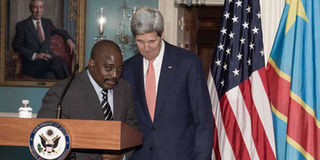DR Congo’s electoral commission chief’s resignation sparks concern

President of the Democratic Republic of Congo Joseph Kabila (left) and US Secretary of State John Kerry leave the lecterns after delivering remarks to the media. DR Congo’s electoral commission chief announced his resignation on October 11, 2015, triggering concern among opposition ranks. PHOTO | AFP
What you need to know:
- Mr Abbott Apollinaire Malu-Malu submitted his resignation as chief of the independent national electoral commission (Ceni) for health reasons, according to a statement carried by state television.
- The resignation comes amid heated tensions in DR Congo over presidential and parliamentary elections due in November 2016, with Kabila’s foes arguing he is seeking to hold on to power illegitimately.
- There is widespread suspicion among opposition parties and human rights groups that Kabila’s clan is manoeuvrings to enable him to serve another term.
KINSHASA
The surprise resignation of the Democratic Republic of Congo’s electoral commission chief, announced Saturday on television, triggered concern among opposition ranks that President Joseph Kabila may be looking to postpone a critical vote due next year.
Mr Abbott Apollinaire Malu-Malu submitted his resignation as chief of the independent national electoral commission (Ceni) for health reasons, according to a statement carried by state television.
The resignation comes amid heated tensions in DR Congo over presidential and parliamentary elections due in November 2016, with Kabila’s foes arguing he is seeking to hold on to power illegitimately.
The constitution bars him from seeking a third elected five-year term at the end of his mandate late next year, but he has yet to comply with opposition demands to publicly state that he will not to run again.
CENI, which is tasked with organising the sensitive elections, brings together figures from across DR Congo’s political landscape.
President Kabila, who came to power in wartime in 2001, has asked Congolese civil society to appoint Mr Malu-Malu’s replacement.
STROKE OF LIGHTNING
Mr Olivier Kamitatu, a member of a group of seven parties known as DR Congo’s G7 that recently switched to the opposition, described the resignation as “a new stroke of lightning in (DR Congo’s political) landscape”.
Samy Badibanga, who heads the main opposition alliance in parliament, showed little surprise however over the resignation.
Mr Malu-Malu was being treated abroad for an undisclosed disease, and had been mostly absent from public view for months.
While it appears the CENI chief really was unwell, “everything seems to indicate that (the government) wants to gain time” ahead of the slated polls, Badibanga said.
“Malu-Malu was CENI’s most qualified expert,” he added, crediting him for the work he did during the 2006 election — DR Congo’s first free poll since the country’s independence in 1960. The resignation “will complicate things” in the countdown to next year’s polls, Mr Badibanga warned.
DR Congo has been marred by political tension since President Kabila’s contested re-election in 2011. None of the votes that were scheduled to be held since then have gone ahead.
TERM LIMITS
The United Nations envoy to DR Congo warned this week that Kinshasa was clamping down on the opposition, adding: “It’s important to have a credible, balanced electoral process.”
US-based Human Rights Watch said in a report this week that Kabila’s ruling party had employed “hired thugs” to attack opposition demonstrators in Kinshasa last month.
Conflict-prone DR Congo stretches over territory two-thirds the size of western Europe and is ranked the world’s least developed state by the United Nations.
There is widespread suspicion among opposition parties and human rights groups that Kabila’s clan is manoeuvrings to enable him to serve another term.
Seven political parties in the Presidential Majority (MP) camp in the Democratic Republic of Congo (DR Congo) have urged President Kabila to respect the Constitution on matters of term limits.





